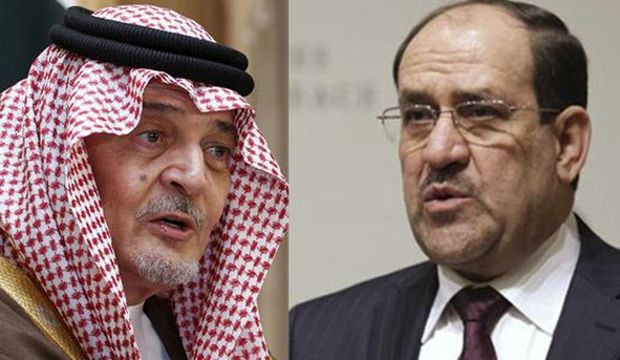After his recent unprecedented attack on Saudi Arabia and his odious calls for the Kingdom to be placed under “international trusteeship,” Iraqi Vice President Nuri Al-Maliki has surely delivered a knockout blow to any chances of rapprochement between Baghdad and Riyadh in the foreseeable future. As one of the primary reasons for the deterioration in relations between the two countries in recent years, and especially during his premiership of 2006–2014, Maliki is making a contribution yet again, in the process pretty much summing up his country’s policies toward the Gulf states. These latest comments by Maliki may be too overtly hostile to have any relation with customary diplomatic parlance; however, I believe they clearly show the true face of the Iraqi leadership with respect to Saudi Arabia. No one is fooled by all the official disavowals and condemnations coming from Baghdad, like those from the presidency and the prime minister’s office published today in Asharq Al-Awsat. All the usual talk and excuses about Maliki’s comments being “his own” and not representing the “opinions and official position of the Iraqi presidency” are disingenuous and, frankly, illogical. After all, the comments came from Iraq’s vice president, and not an opposition MP or someone unconnected with the leadership in Baghdad. As such, one can say that the official Iraqi response to Maliki’s repellent attack—which has sought to downplay and gloss over the incident—is completely unforgivable.
Ever since Haider Al-Abadi succeeded Maliki as Iraq’s prime minister, he has paid ample lip service to the notion of ending the explosive sectarian policies of his predecessor (ones which appeared at times to take on the whiff of an almost-sacred mission for Maliki). With this in mind, several neighboring countries decided to turn a blind eye to various comments and provocations coming from numerous Iraqi officials during this period, all in the hope that this would help restore stability to the country which Maliki had so successfully drowned in a bilious sea of sectarian chaos and violence. The truth, however, is that Abadi has continued down the well-trodden path set by his predecessor, despite all the seeming changes. Iraq remains a client of the Iranian regime, something which has helped stoke the flames of sectarianism in this great country in ways previously unseen throughout its long and illustrious history, placing it before dangers which have threatened and continue to threaten its national unity and cohesion.
The language used by Maliki during his latest tirade proves for the hundredth time that those who currently govern Iraq are not serious about “turning a new page” on reestablishing relations with its neighbors as previously claimed. The flames of sectarianism which they have helped fan are a direct cause of two of the biggest catastrophes Iraq has faced during recent years: the Islamic State of Iraq and Syria (ISIS) on the one hand, and the Shi’ite Popular Mobilization forces on the other, both of which began tearing Iraq apart during Maliki’s premiership.
And let’s not venture into discussing the details of some of Maliki’s other recent distasteful comments, this time regarding the Qur’an and some of the Prophet Muhammad’s Companions, comments which have offended Muslims worldwide. What Maliki said here led the Islamic Educational, Scientific and Cultural Organization (ISESCO) to say that his comments “fuel the sectarian strife waged by parties with expansionist racist ambitions known to all, and stir up hatred and discord among Muslim communities.” It doesn’t take much effort to link Maliki’s comments on the Qur’an and the Companions to some of the recent unprecedented incitement by the Tehran regime against Riyadh, which coincided with the beginning of the Saudi-led airstrikes against the Houthis in Yemen—and, which, by the way, also correspond almost exactly to Haider Al-Abadi’s own position on this issue.
No, Iraq’s politicians, with Abadi at their head, do not seem by any stretch of the imagination to want to “turn a new page” in relations with regional countries. It was not enough that Maliki led the country as prime minister for eight miserable years. Iraq’s politicians saw it fit to hand him the role of vice president after his premiership ended so he can continue souring relations between Iraq and its neighbors, despite the calamities which his sectarian policies brought upon the country during his time in office.
May God have mercy on Saud Al-Faisal, Saudi Arabia’s former foreign minister, who responded to Maliki’s regular diatribes about the Kingdom sponsoring terrorism with masterful aplomb: “Maliki’s accusations against us regarding sponsoring terrorism are a matter of ridicule. Here [in Saudi Arabia] we have outlawed ISIS . . . My advice to Maliki is that he follows the policies adopted by the Kingdom when it comes to fighting terrorism.”
May God have mercy on you, Prince Saud. But, sadly, those whom you addressed do not heed honest advice from fellow Arabs; they only follow orders from their Persian masters.
